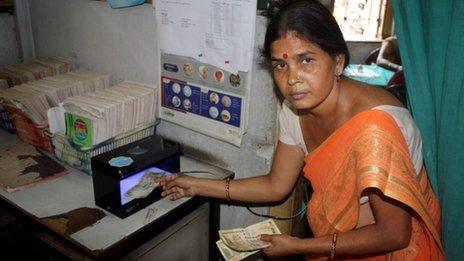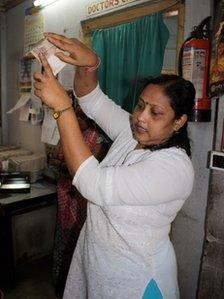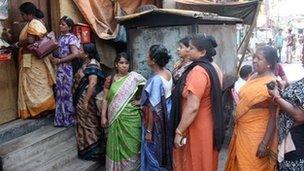Teaching Indian sex workers to spot fake currency
- Published

Not all fake notes can be detected by the naked eye and a machine can help spot counterfeit currency
In the eastern Indian city of Calcutta, a non-governmental organisation has started a programme to help sex workers recognise fake currency given to them by clients, reports the BBC's Rahul Tandon.
It is another busy day for Satabadi Jana in one of Asia's largest red-light districts, Sonagachi, where more than 10,000 prostitutes live and work.
A group of sex workers is crammed into a small room, which serves as Ms Jana's office. They listen carefully to what she has to say.
Normally, they come here to get advice about how to avoid contracting HIV.
But today, the subject on the agenda is how to spot a forged bank note.
Cross-border counterfeits
Over the past few months, women here have received a large number of counterfeit 500-rupee ($9; £6) and 1,000-rupee notes.
The authorities believe that the notes are coming in from across the border in Bangladesh.
Seema Fokle has been working in Calcutta's red light district since she was a young girl.
She pulls out a note and thrusts it towards me. "Look at this," she says as she waves a 500-rupee note in my face. "It's a fake and it's as worthless as the man who gave it to me."

Satabadi Jana teaches women how to recognise fake notes
All the other women nod their heads in agreement.
It is a problem that all of them have had to deal with. And it is making life even more difficult than normal.
Some of the women here earn just 100 rupees ($1.85; £1.21) a day.
Areas like Sonagachi are the perfect place to circulate counterfeit currency as the women are too scared to go to the police.
Ms Jana laughs when I ask her if any of the women have filed a police complaint after receiving fake currency.
"All of the girls are afraid to go to the police. They fear that they will end up being arrested if they go and complain.
"Anyway who is going to listen to a sex worker?" she asks.
Shefali Roy, who has received many fake notes, says: "If I go to the authorities, I will lose business. If my clients know that I have been to the police, they will stop coming here. And then how will I survive? It is better to just keep quiet."
Ms Jana holds up a 500-rupee note up in the air so that all the women can see it.
She points to what looks like an empty space on the left side and then holds it up against the light and suddenly a picture of Mahatma Gandhi appears with the number 500 written on it.
The women start laughing and one of them jokes: "Satabadi, you are a magician."
She smiles and then shows them a series of other ways in which they can spot fake notes with the naked eye.
Sometimes, though, it is not possible to detect whether a note is real or not just by looking at it.
Brisk Business
So the organisation that Ms Jana works for, the Durbar Mahila Samanwaya Committee, has put a machine in its office that uses ultraviolet light to detect forgeries.

The sex workers are too scared to report the fake notes to the police for fear of being arrested
Not surprisingly, it is much in demand.
Seema Fokle says that if a client gives her a suspicious-looking note, she comes here to check it. "If it's fake, I ask them to change it and they do."
Ms Jana says that since they started the training programme, the number of fake notes in the area has declined by around 20%.
Prostitution is illegal in India but the country has more than three million sex workers.
Campaigners say the real figure is much higher than that and many of those working in the illegal sex industry are children who are trafficked from some of the poorest parts of the country.
By the time this training programme finishes, more than 10,000 women will have been taught how to recognise fake notes.
Ms Jana hopes that it will help one of the world's oldest professions get to grips with one of the world's oldest problems.
- Published20 October 2011